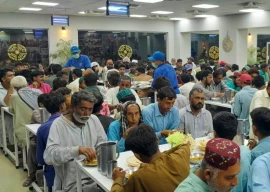
Faisalabad, the textile capital of Pakistan, has now become a paradise for scrap-dealers due to the increasing trend of selling of weaving machines or power looms which were badly hit by the energy crisis, increase in running cost of business, insecurity and law and order problems.
Not only are the local scrap dealers busy in purchasing power looms from sick industrial units but some foreign buyers are also engaged in this trade in Faisalabad and its adjoining areas like Toba Tek Singh, Gojra, Sammundri and Chiniot.
But this is all at the cost of the national economy of Pakistan. The textile sector is the main industry of Pakistan, having a 54% share in the total exports of the country, besides a huge investment of about $10 billion in it. It has a 46% share in the manufacturing trade of the country with 38 to 40% share in labour. But now hundreds of thousands of workers have been laid off.
Faisalabad is on top in the number of power looms in the country and cloth trading. But unfortunately this centre is now turning into a junk market.
Azeem Awan, a registered scrap dealer operating in various countries - especially Pakistan, Gulf, Bangladesh and Sri Lanka- says, “Yes we are working in Faisalabad for the last two years and shifting power looms to Bangladesh after purchasing them at throwaway prices.
The dealer said, “I sometimes buy up to 100 looms in a day, paying just Rs1 million for machines that actually cost up to Rs8 to 10 million”.
“Whenever the textile business, especially power looms suffers, our scrap business booms”, another dealer Sharif Awan said.
Shahbaz Sindhu, a local scrap dealer of Darul Ehsan Scrap Market, said, “Previously we were engaged in sale and purchase of heavy power generators due to sufficient profit but for the last three years, we have switched our business over to purchase of powers.”
Factory owners are rapidly scaling down operations. Industrialist Muhammad Idrees Nagra, who has been involved in the textile trade for over 40 years said, “If looms continue to shut down at this rate, a day will come when we won’t have any business at all. What will we do then? I had four power loom factories in different parts of the city till late 90’s, but now I have only one factory of 200 looms.”
Hajji Muhammad Shafiq, one of the pioneers in power loom industry in this city, said that this alarming situation has not only sent the power looms owners in deep shock but hundreds of thousands of workers who are working in these units are also worried about their employment.
Rana Amjad, owner of 500 power looms, said that a good number of workers are already facing the brunt of the crisis in this sector as we have reduced the three working shifts to one.
“In this backdrop, over 100,000 workers have been laid off while those who were earning additional money in shape of overtime have also lost the opportunity to fetch maximum earnings due to their expertise in the power looms operations,” he said.
“We have no regret in informing that we are terminating the services of employees from our factories because none of the government agencies are ready to support us and neither are they trying to save this crippling industry”, he added.
Khan Muhammad, a renowned financial expert and business analyst seems hopeless for the revival of power loom industry of Faisalabad.
“Those who are directly or indirectly related with the power loom sectors are suffering, but an overwhelming population of the city too has to bear the brunt of the crisis of this sector. Over 500,000 people involved in this trade have indirect source of income from the textile sector”, he said.
Commenting on the present situation, Waheed Khaliq Ramay, Chairman of Council of Loom Owners Association (CLOA) – a body representing owners of power loom factories– said that about 95% weaving industries of Pakistan are situated in and around Faisalabad.
“300,000 upper looms and 225,000 power looms are running in Faisalabad at present and are making clothes not only for Pakistanis but for Afghan people also.”
About 75,000 auto and shuttle less looms are busy in making export fabric in Faisalabad”, he said, adding, “Weaving industry is manufacturing 11.5 million meter clothes daily in Faisalabad by using 55% yarn of spinning industry”.
Ramay, expressing dismay and anguish over six hours of electricity load-shedding a daily basis, said that it has hit the power looms sector very badly and 25 to 30 thousand power looms have become scrap during the last two years.
“Gas crisis has further aggravated the situation,” he added.
Published in The Express Tribune, October 10th, 2011.
COMMENTS (1)
Comments are moderated and generally will be posted if they are on-topic and not abusive.
For more information, please see our Comments FAQ
































1714024018-0/ModiLara-(1)1714024018-0-270x192.webp)









Now PAK cotton will be cheaper as there is going to be less domestic demand from spinning mills leading to further downturn.
Nearly 50% share in export industry failing is unacceptable to any economy. . Beg, borrow, throw the pride out the widow, buy electricity, run the power plants and supply the mills.